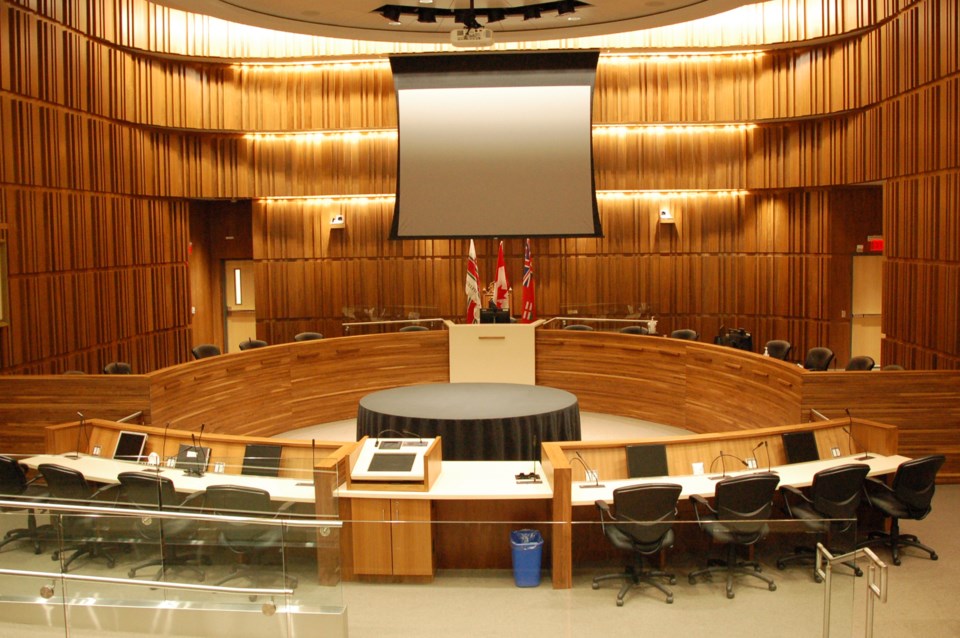Several pandemic-inspired procedural changes are coming, including allowing electronic petition submissions and launching a pilot project permitting video delegations.
“There are all types of mayors and councillors talking about how these types of (virtual) meetings have opened up an opportunity to have better engagement and have better participation,” said Mayor Cam Guthrie, who pointed out council and committees started holding virtual meetings one day short of a year ago in light of the pandemic. “Originally, it was supposed to be a couple meetings.”
During a special meeting on Monday afternoon, council unanimously approved a series of motions that make changes to how it conducts business, known as a mid-term governance review.
Among them is the launch of a three-month pilot project regarding video delegations, which are currently required to happen over the phone or, when health regulations allow, in person. At the end of the project, city staff is to report to council with its findings and the potential creation of a formal policy.
The pilot project involves end-of-month city council meetings only, not committee of the whole or others.
“Our intention moving forward is to have some sort of hybrid,” deputy clerk Dylan McMahon explained of future meetings, which could include a combination of in-person and virtual participants.
The pilot project is needed to gauge staff resources around making sure all delegates can properly use the technology needed to appear as a video delegate, McMahon added in response to Guthrie’s suggestion it should “just happen” now.
“I would hope we can make it happen,” said Guthrie upon hearing the deputy clerk’s explanation.
Another key potential change is the acceptance of electronic petitions, which are not currently allowed. A policy will now be developed and presented to council for consideration.
Several council members raised concerns about the ease of which electronic petitions can be signed by non-residents – something they want the policy to address.
“There’s different types of electronic petitions,” said Coun. Leanne Caron, noting “most of the mainstream” sites require the signitor’s address. “We are responsible to the citizens of Guelph. Our bylaws and our policies should reflect the citizens of Guelph.”
The policy is also intended to consider how personal information is redacted, as well as the threshold for the number of signatures a petition must have before it is accepted and made public.
Delegate Susan Watson spoke out against a recommendation to delegate authority to staff in deciding whether submissions include “obscene” and “defamatory” language – something she equated to giving staff “censorship powers.”
“Political speech is the most valuable and protected,” she said.
However, the idea received council’s approval, after McMahon explained the city’s legal department would be consulted before submitters are given an opportunity to change any flagged language. If they’re unwilling to make changes, council would receive a memo letting them know and they would have the ability to discuss it behind closed doors to decide if the document, in its original form, should be made public.
The primary concern, notes a staff report on the recommendations, is that the City of Guelph could be considered a “broadcaster” of libellous or slanderous material in the eyes of the law.
Additional changes include the way councillors can bring forward new issues for debate, known as a notice of motion.
Previously, the notice of motion process could take several months to complete, as the committee of the whole would have to vote without discussion on whether the issue was of enough value to refer it to council for a decision to refer it back to the committee for discussion, after which it could be referred back to council for potential approval.
The first step has now been eliminated, removing about a month from the time it takes for a notice of motion to work its way through the approval process.
“I’m really glad that this has changed,” said Guthrie.
A notable item that hasn’t changed, despite new authority from the province to allow it, is the prohibition of proxy voting. That’s the process by which a council member whose unable to attend a meeting gives permission for another council member to cast a vote on their behalf.
No one spoke in favour of this new option and staff made no recommendation about whether it should be adopted.
